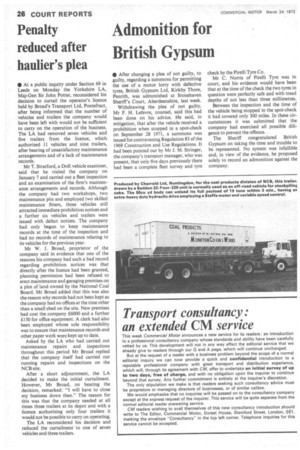Penalty reduced after haulier's plea
Page 28

If you've noticed an error in this article please click here to report it so we can fix it.
• At a public inquiry under Section 69 in Leeds on Monday the Yorkshire LA, Maj-Gen Sir John Potter, reconsidered his decision to curtail the operator's licence held by Broad's Transport Ltd, Pontefract, after being informed that the number of vehicles and trailers the company would have been left with would not be sufficient to carry on the operation of the business. The LA had removed seven vehicles and five trailers from the licence, which authorized 11 vehicles and nine trailers, after hearing of unsatisfactory maintenance arrangements and of a lack of maintenance records.
Mr T. Stratford, a DoE vehicle examiner, said that he visited the company on January 7 and carried out a fleet inspection and an examination of the firm's maintenance arrangements and records. Although the company had two workshops, two maintenance pits and employed two skilled maintenance fitters, three vehicles still attracted immediate prohibition notices and a further six vehicles and trailers were issued with defect notices. The company had only begun to keep maintenance records at the time of the inspection and had no records of maintenance relating to its vehicles for the previous year.
Mr W. J. Broad, proprietor of the company said in evidence that one of the reasons his company had such a bad record regarding prohibition notices was that directly after the licence had been granted, planning permission had been refused to erect maintenance and garaging premises on a plot of land owned by the National Coal Board. Mr Broad added that this was also the reason why records had not been kept as the company had no offices at the time other than a small shed on the site. New premises had cost the company £6000 and a further £150 for office equipment. A clerk had also been employed whose sole responsibility was to ensure that maintenance records and other paper work were kept up to date.
Asked by the LA who had carried out maintenance repairs and inspections throughout this period Mr Broad replied that the company itself had carried out running repairs and inspections on the NCB site.
After a short adjournment, the LA decided to make the initial curtailment. However, Mr Broad, on hearing the decision, remarked: "I will have to close my business down then." The reason for this was that the company needed at all times three trailers at its depot and with a licence authorizing only four trailers it would not be possible to carry on operating.
The LA reconsidered his decision and reduced the curtailment to one of seven vehicles and three trailers.




















































































































































